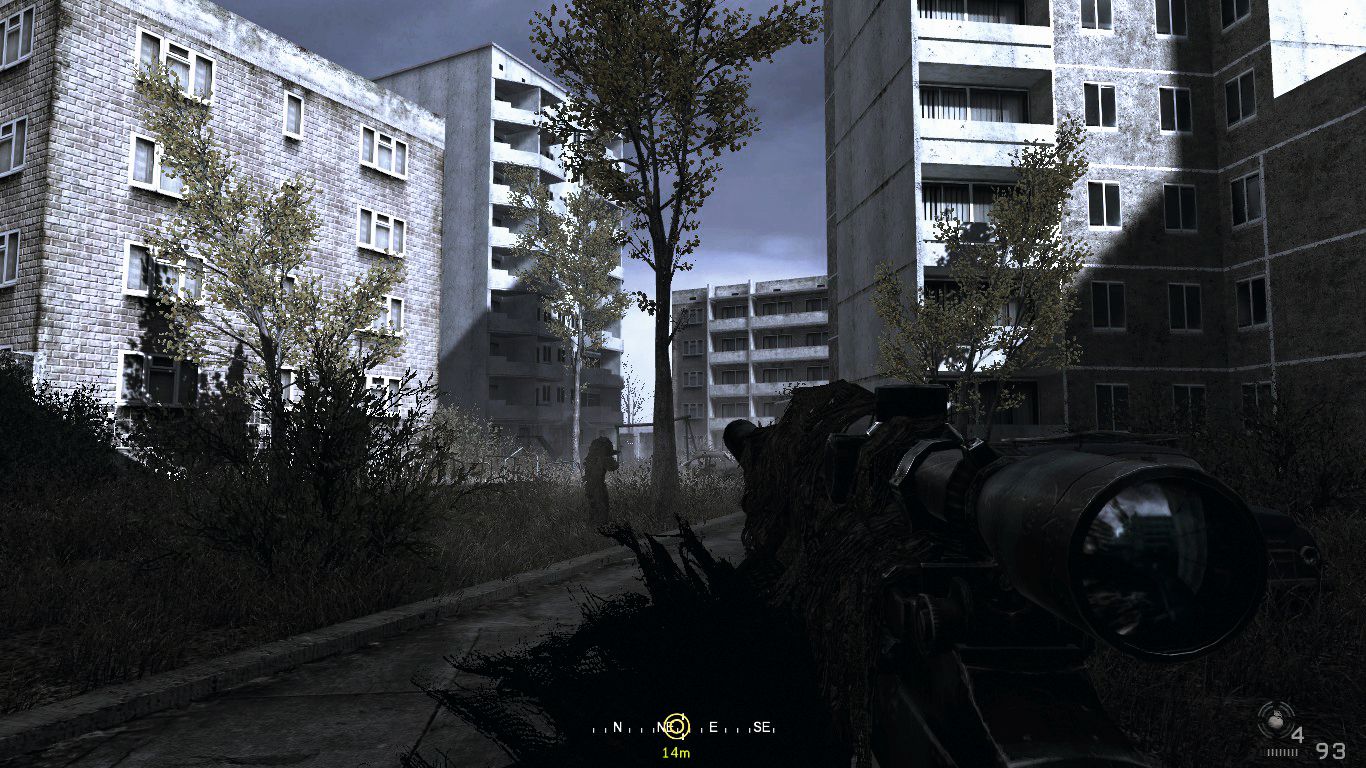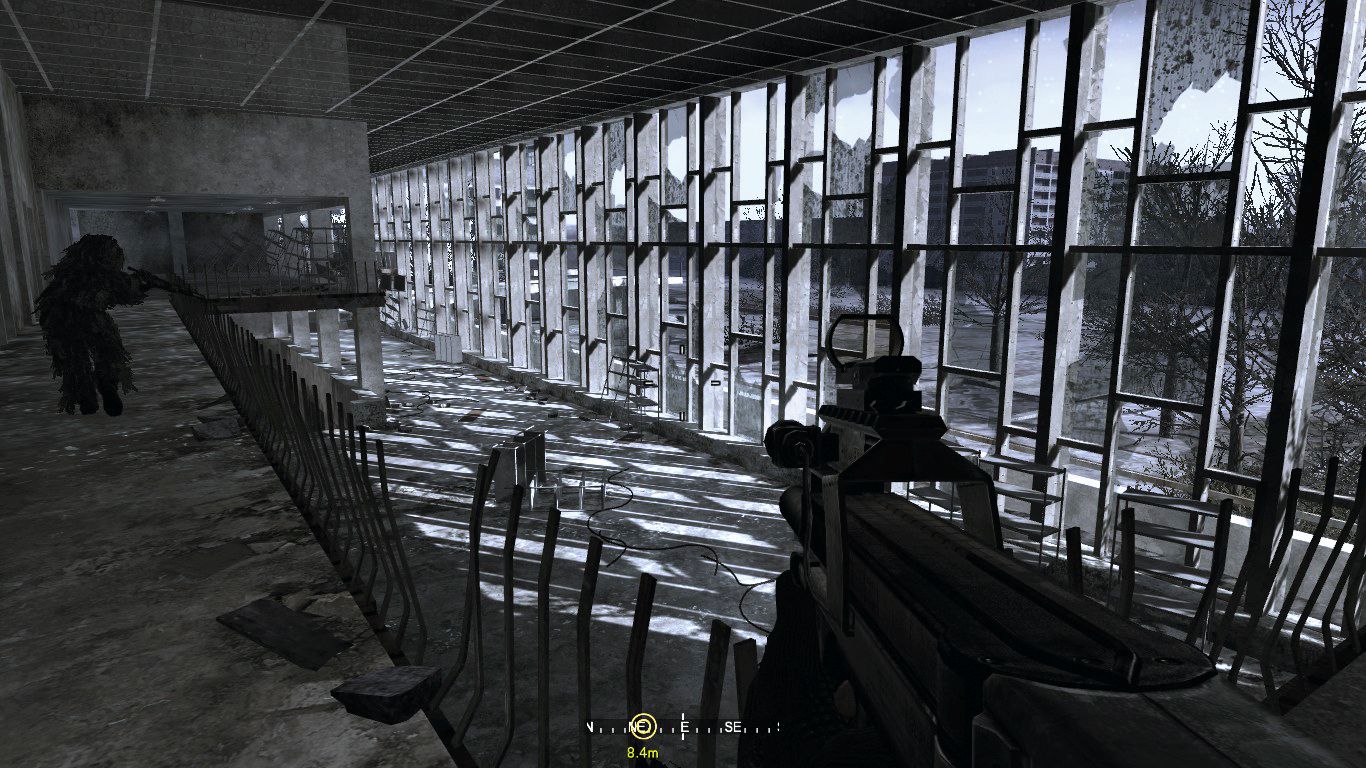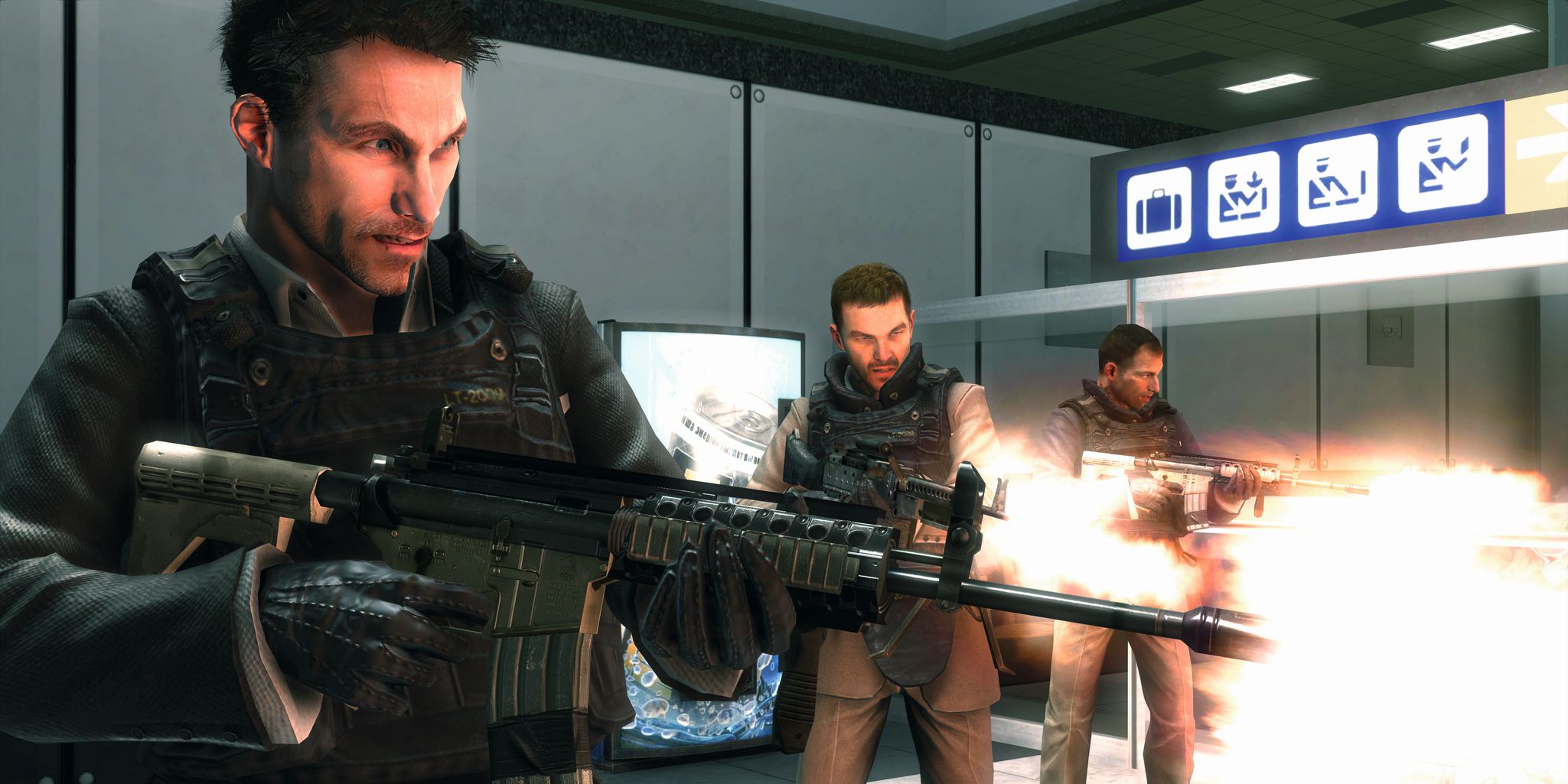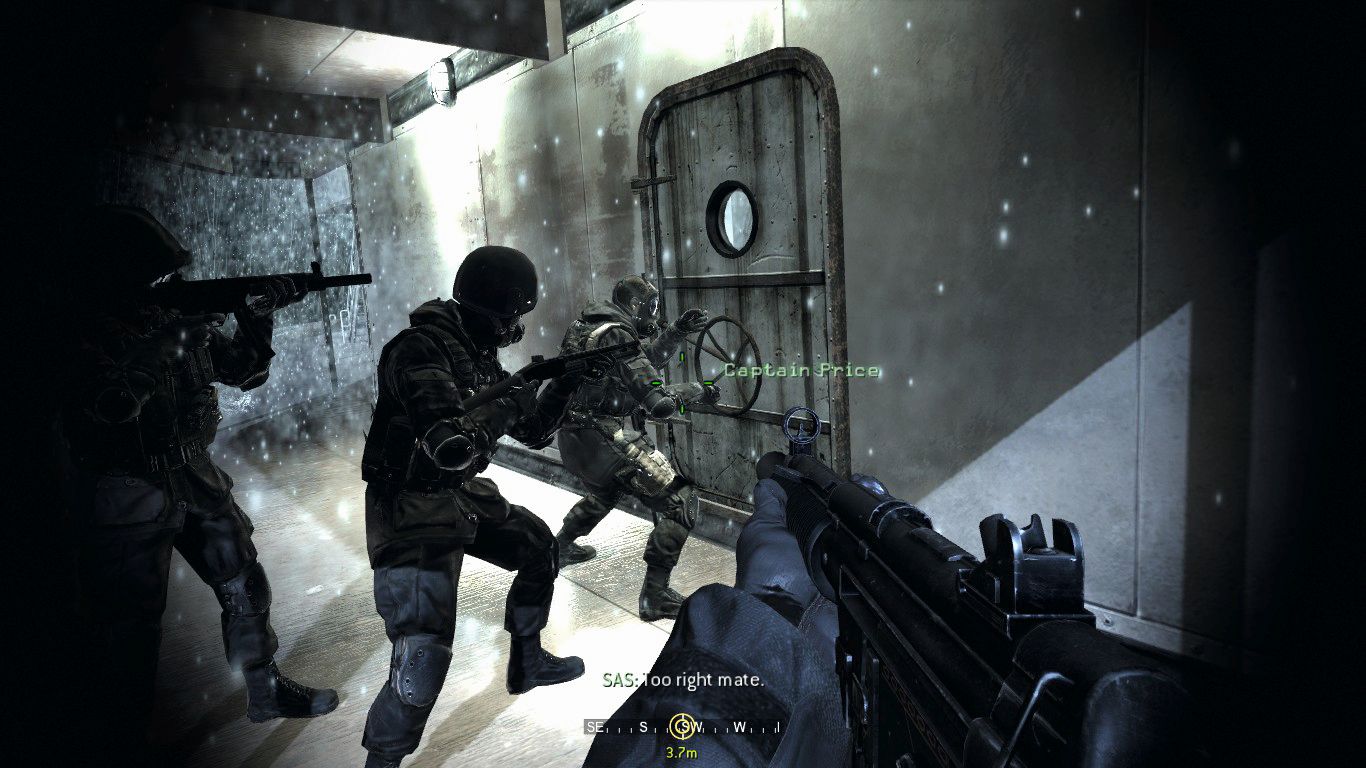From All Ghillied Up to No Russian, the making of Call of Duty's most famous levels
We talk to the designer behind the series' greatest moments.

“To feel right, the AI needed to be programmed with every possible reaction to every possible thing the player could do, and double that for MacMillan,” says Alavi. “Which meant it took me three months and over 10,000 lines of code to do the first minute of gameplay for AGU. [Lead designer] Steve Fukuda sat down at my desk to play the first minute, and he replayed it for half an hour, ten different ways, and had fun each time. For me that was a real success.” So entertaining was Alavi’s script, it became the basis for the AI in Modern Warfare 2.
Nowhere is the level’s reactivity more apparent than in the personality of Captain MacMillan. Where other escort characters are forever ordering you around, he presents you with scenarios and allows you to work out your own solutions using the tools available, with bespoke dialogue for each outcome. MacMillan will encourage you to avoid the helicopter, for example, but if you really want to tangle with it he’ll back you up. Likewise, slotting a wild dog is acceptable, providing you can deal with the rest of the pack. It’s gently empowering, and forms an intriguing contrast to the level for which Alavi is nowadays best known, Modern Warfare 2’s No Russian.
It starts not with a bang or the crash of a door being kicked in, but a whisper. “Remember, no Russian.” You’re in an elevator with a small group of men in body armour, all holding light machine guns. The doors open and you stroll out towards a crowd waiting at an airport baggage check-in. Two security officers turn in mild surprise. There’s a jolt of realisation, a half-second in which you cotton on to what the game expects of you. Then, you open fire.
For better or worse, No Russian is a watershed moment in the debate over the ethics of representation in videogames. It casts you as a US double-agent operating within the terror organisation of Vladimir Makarov. In order to prove your loyalty, you must take part in an attack on a Moscow airport—a cold-blooded killing spree in which the wounded are casually finished off as they drag themselves away from you, which evolves into a running battle with security forces and ends with your betrayal and execution right outside the getaway van. Makarov, it transpires, knew of your deception all along, and hopes the discovery of an American agent’s body at the scene will provoke war between the US and Russia.

Whether an interactive massacre is the right fit for an entertainment product is a question for the individual player. No Russian provoked heated exchanges in the press at release, some praising it as a statement about how desensitised we are to videogame violence, others accusing Alavi and Infinity Ward of including the scene to raise the game’s profile. He rejects both claims. “I mean honestly, Call of Duty didn’t need any more publicity.” Rather, as Alavi explained in 2012 to fellow designer and writer Matthew Burns, the aim was simply to build up the game’s villain in a memorable and player-driven fashion, rather than in the worn-out form of a cutscene.
No Russian was originally the brainchild of Steve Fukuda, but Alavi was behind almost every aspect of its creation, from scripting Makarov’s team to motion-capturing the animations used for dying civilians. “It took lots of iteration to get the first half of the level right. I was in and out of the mo-cap studio multiple times to re-shoot sequences, as well as redesigning and iterating on that first half over and over again. The massacre could easily have felt cheesy or gimmicky if it blended too quickly into the combat portion near the end.”
I could have taken it to a much darker place, but that would have been just for shock value.
As convincing as it may seem, the level isn’t based on a real-life massacre. “I didn’t interview anyone for a couple reasons,” says Alavi. “I honestly don’t think I could emotionally handle a face-to-face recount of such an event in a person’s life. I wouldn’t even know what kind of questions to ask without sounding like I have an agenda. I wouldn’t want anyone to relive that story just so I could have some juicy titbits for a piece of entertainment. All my research was done through news articles and movies.”
Keep up to date with the most important stories and the best deals, as picked by the PC Gamer team.
Alavi also edited the portrayal to stop it being too traumatic. “I made sure to handle it as tastefully as I possibly could without diluting the gravity of the moment. For example, I made the decision to not have any children in the airport. I didn’t have families huddling together in fear, I didn’t have people crying out the names of husbands, wives or children. I could have taken it to a much darker place, but that would have been just for shock value.”

Publishers typically shy away from content that breaks taboos, but Alavi isn’t aware of any pushback on No Russian from Activision, and most colleagues at Infinity Ward were supportive. “There was a bit of resistance from some members of the team which led to some small design changes and revisions,” he recalls. “There were obviously strong feelings about participating in a virtual act of terrorism, as well as firing on the armed forces sent to prevent you from shooting up an airport.”
Feedback from randomly selected playtesters ran the gamut of responses, Alavi says. “The most memorable reaction was from an enlisted gentlemen who immediately put down the controller and left the room. He said he wouldn’t play that level. He would play the rest of the game, but not that level. That’s where the decision to make it skippable came from. We didn’t want anyone interested in the rest of the game to be blocked by something they found morally wrong.” Even if you do choose to play No Russian, it’s possible to get through it without firing—given enough patience, Makarov’s team will roll over all the opposition without any help, and without turning on you for your non-involvement.
In some ways this does No Russian a disservice. Allowing players to opt out implies, after all, that the sequence isn’t necessary to the narrative, and thus reinforces the suggestion that it was included purely to scandalise. But in a certain light, No Russian is more powerful for being optional. It’s not just that the sequence prompts reflection on how willing players are to follow ethically dubious orders in videogames. Where All Ghillied Up is a camouflaged celebration of player choice that invites you to push against the confines of the scenario structure, No Russian feels like calculated, vicious mockery of the desire for agency. It waltzes you through depictions of carnage without even granting you the courtesy of a central role, requiring only that you are present throughout. Then, it puts a bullet in your head as you’re approaching the exit.
Makarov is a villain in a couple of senses. On the one hand, he’s a genocidal maniac. But in a more enduring sense, he’s a player-hater, a griefer who denies you the meaningful participation games are supposed to provide, even if only on paper. Where MacMillan is your mentor but not your boss, Makarov’s defining act is to punish you for the presumption of wanting any kind of control at all.

It’s harder to pick up on the detail of Alavi’s design and scripting in the multiplayer-only Titanfall—the story beats in the ‘campaign’ mode are easily overlooked. The spectre of his work on the Modern Warfare series is almost palpable, however, in the game’s mission intros, each a brisk but stylish first-person sequence that grounds the ensuing battle in the wider fiction.
Alavi bears much responsibility for the fact that Titanfall has a narrative component at all—he pushed for longer and different introductions to each campaign map, designing one for Airbase in three days to demonstrate this could be achieved within budget. His and Modern Warfare’s influence is perhaps also apparent in how Titanfall’s on-map AI allies support the player, though MOBAs are the more obvious comparison. They’re at once scenesetting and a tactical resource, calling out the locations of enemy pilots and remarking on your actions as you pass.
Does Alavi ever miss Call of Duty? Seemingly not. “The Call of Duty games are well-made titles, but after this many years they are experiencing brand fatigue. I’m proud of my previous work, but more excited about being at Respawn Entertainment and the future of Titanfall.” In general, he feels the FPS is in dire need of fresh thinking. “The genre has become so stagnant. People like to point to military shooters and say they all look the same, but to me, regardless of setting, all shooters kind of look the same these days.”
Yet Alavi has limited patience for “gimmicks” like virtual reality or motion control; designers, he insists, remain the key to the industry’s future. “Augmented reality is more viable in my opinion because the barrier into unfamiliar territory for the consumer is lower, but I’m a purist at heart. I still believe that innovation will come from familiar concepts expertly juxtaposed to make something revolutionary.”
It’s a point amply supported by No Russian and All Ghillied Up, two missions that rely on many of the same approaches and devices as other CoD levels and of shooters in general, but which stand apart in the execution. As Call of Duty continues its attempts at reinvention. adding exosuits and singleplayer upgrades, it’s worth reflecting on how much Alavi’s grandest efforts achieve with comparatively little. I hope designers continue to follow in his footsteps.

